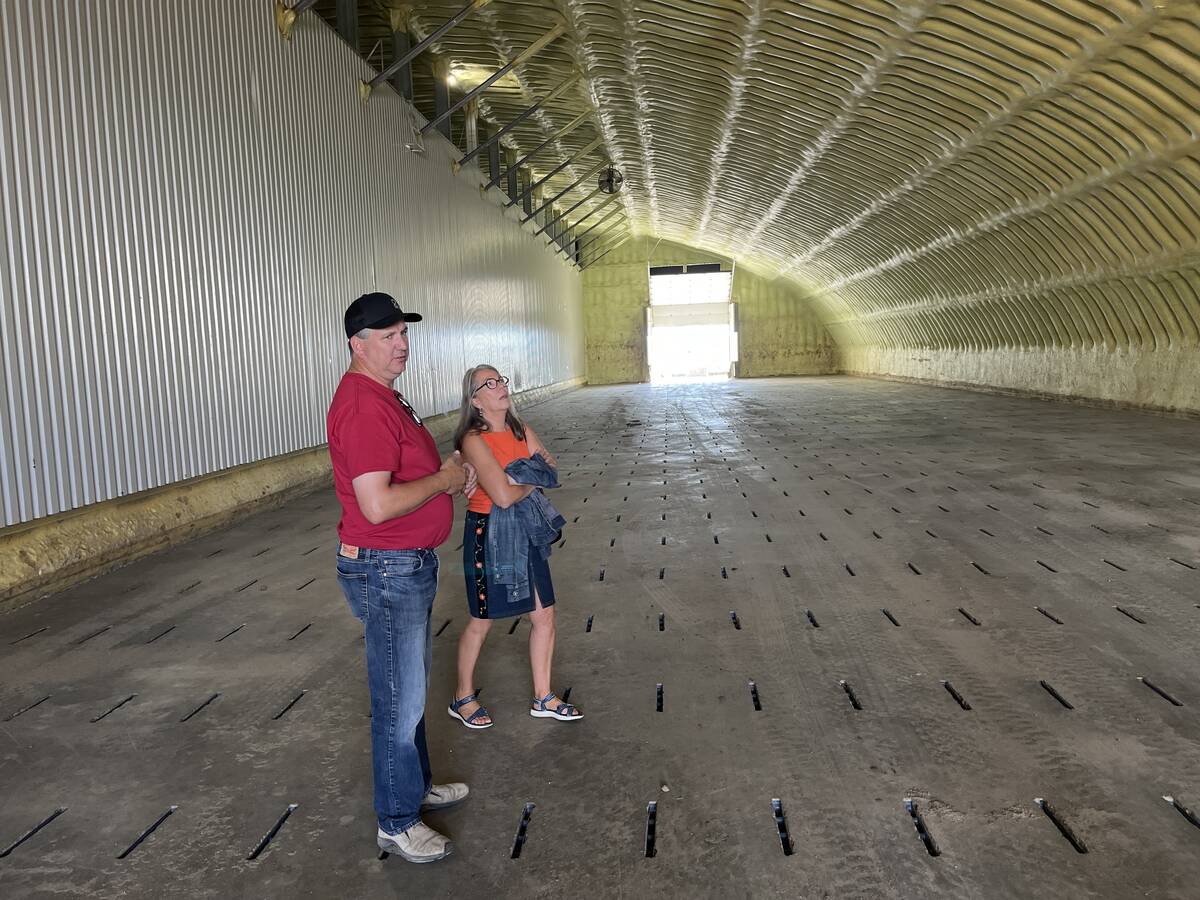Milk dispensers and other farm vending machines are a common sight in Europe and the U.K. but not as much in Canada
“You’ve got to see this” was my favourite phrase while I wandered around the British Isles for a month last summer.
It promised adventure and something new.
The best experience that followed that phrase was a visit to Millview Farm Vending near Ards and North Down in Northern Ireland. Located at the end of the farmer’s drive, the milk dispenser was filled with milk from the farm’s own dairy herd, the cows close enough to watch every transaction rung through the automated machine. I didn’t ask them what they thought.

Tapping my credit card and making my selection, I had pasteurized, fresh whole milk straight from the tap in a matter of seconds, a glass bottle on loan from my friend for the experience. Minutes later, the sliding door to the tap was sealed, cleaned and ready for the next customer.
Read Also

Potato farm requires year-round management
The most recent Open Farm Day in Alberta showcased agricultural producers across the province educating the general public about the process that is required is to get food to their table.
I was even feeling extra adventurous, so the milk was also blue, the added bubblegum syrup making the milk taste just like the ice cream flavour I commonly chose as a kid. Looking down at the Star Wars shirt I was wearing, the little nerd in me was squealing with delight.
We started drinking it before we even got in the car.
This is a regular thing for my Irish friend, but she knew this was probably a new experience for me.
Milk dispensers and other farm vending machines are common in Europe and the United Kingdom. According to a recent article in Farmers Weekly, there are about 400 machines in the U.K. alone with the COVID pandemic driving consumer demand for more locally produced food.
As I finished off the rest of the bottle, I had only one thought: could I experience this again at home?
Yes, I could, and even all year round.
A short trip north of Saskatoon and you’ll come across Sunnyside Creamery and Farmyard Market with the only milk-on-tap machine in Saskatchewan.

Owned by Bas and Martha Froese-Kooijenga, the market has been open since 2015, selling freshly made perogies and pies and meat, eggs and vegetables, just like Martha’s parents used to do from the same farmyard. When their customers started requesting milk and milk products, they started looking into how they could offer that as well.
It took a lot of work, and the couple had a lot of back and forths between SaskMilk, the Saskatchewan Health Authority and the Ministry of Health, they said.
At the time, regulations weren’t conducive to having milk production right on the farm. Dairy farmers fill quotas with the milk they produce, which is then processed in larger facilities. With the Saskatoon plant being so close, Bas said there was a lot of discussion about the viability and safety of an on-farm operation.
Eventually, they were seen as possible ambassadors for the dairy industry, said Bas.
“We are a good representative of the dairy industry at home. We understand that because we get a lot of people in the yard, and they can look around and they can ask questions.”
Nancy Gourlay was another huge help as the Froese-Kooijengases navigated how to get their dispensary going, said Martha.
Gourlay and her late husband, Clarke, owned the Little Qualicum Cheeseworks in Parkville, B.C., and opened the first milk-on-tap location in Canada in 2017. Nancy has since retired, and Chelsea Enns and Albert Gorter bought the location in September 2021.
Enns said Vancouver Island’s mild weather and Parkville’s strength as a tourism destination created a huge draw for their farm market and their milk on tap machine, both for tourists and locals.
On average, Enns said they sell about 120 litres per day with plenty of return customers.
“They try our milk, and they can go and see the cows and where (the milk) came from, literally, that morning,” Enns said.
“They make it a part of their weekly routines where they come and they get milk. The locals have made us such a big part of their diet, and they trust us with giving them a really good product.”
Gourlay was a big part of their journey, said Martha. She answered their emails and even referred them to a company in Switzerland for their machine. With a daughter in Saskatoon, Gourlay still comes to see them, said Martha.
After two years of getting regulations in order, the couple opened their own milk dispensary in April 2019. While it was frustrating at times, Bas said it has been a worthwhile venture and now they’re on the same regulatory standing as bigger milk companies in the province.
“We can do what we want, we can process however much milk we want. We can make any type of product that we want. So there are no more limits to what we can do,” said Bas.
The dairy operation is small with only 30 cows producing around 10,000 litres per month, although that’s still a lot of bowls of cereal, Bas said with a laugh.
They still fill their quotas with SaskMilk, but buy back more than half their production to use in their own facility, whether that’s to put into the dispenser or for their cheese, yogurt and cottage cheese products.
The dispenser’s two tanks hold 400 litres at a time of fully pasteurized whole milk.
Given the climate on the Canadian Prairies, the machine is located in its own shed with strict business hours six days a week and is thoroughly cleaned every day. In nearly five years of having the machine, they’ve never had problems with recalls or health and safety standards, said Martha.
SaskMilk’s mission is to build a healthy provincial and national dairy industry through support and regulation of the province’s dairy producers, organization spokesperson Anne Lindemann said in an email.
“All SaskMilk dairy producers are required to follow rules, regulations and policies as set out by the SaskMilk board of directors. Dairy producers are regularly inspected to ensure the highest quality of livestock health, sanitation standards and handling of milk products during the milk production process, including on-farm storage standards. Each dairy is inspected at least once per year by SaskMilk. All dairies across Canada are held to strict standards and validation processes within the national proAction program.”
The Froese-Kooijengas have received many inquiries over the years about how farmers can have their own dispensary, both in Saskatchewan and in other provinces.
Martha said location has been a big part of their success, considering their location on a busy highway and close proximity to Saskatoon.

















